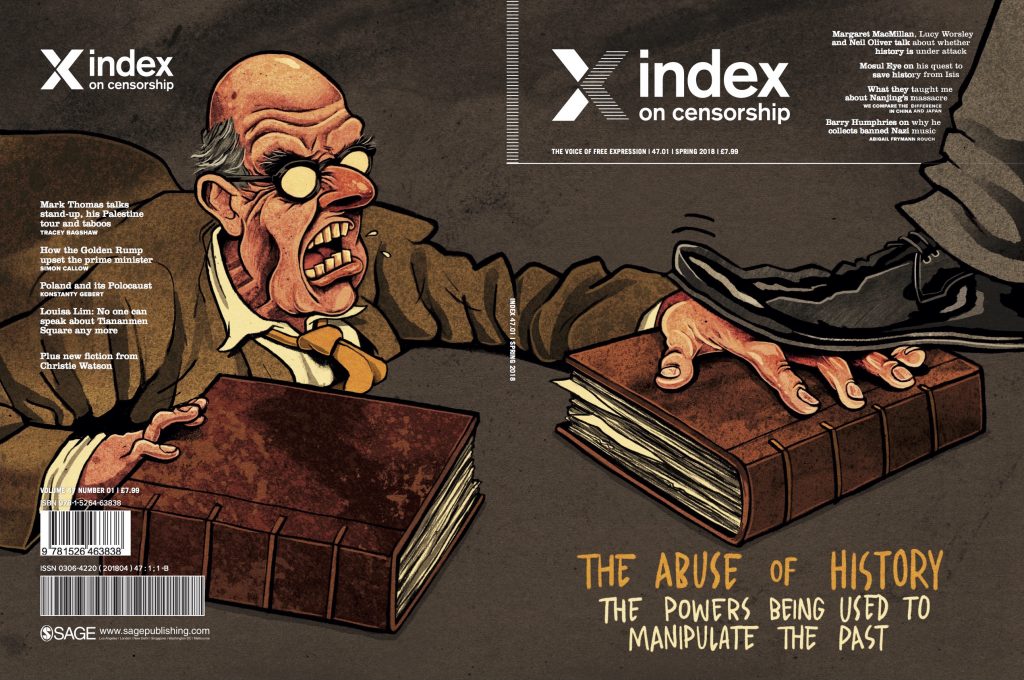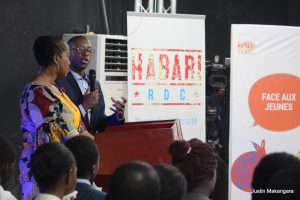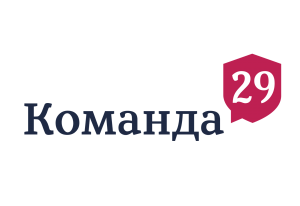31 Jul 2018 | Artistic Freedom, News and features, United Kingdom
[vc_row][vc_column][vc_gallery interval=”3″ images=”101853,101849″ img_size=”large”][vc_column_text]Dressed in t-shirts and sneakers, a group of teens files into a large, white-walled room reminiscent of a school gymnasium. A stage looms over a motley audience of chairs, its walls plastered with handmade collages of redacted newspaper headlines. It could be any summer programme, but when professional opera singer Abigail Kelly begins leading the students in a song on political dissent and dictatorship, it’s clear that they’ve come together to create something novel, provocative and, above all, youth-led.
This is the English National Opera’s (ENO) Baylis Summer Youth Project, which invites students ages 13-18 from around London to create and perform a new piece of music theatre with the support of professional directors, composers and performers. This summer’s programme challenges participants to think critically about issues of censorship, both modern and historical.
The programme responds to Effigies of Wickedness, a collaboration between ENO and the Gate Theatre. Effigies presented songs censored and banned by the Nazis in the 1930s. The youth project features these songs which were, as assistant composer Kelly rehearsed in one scene, “degenerate music […] especially music written by Jewish composers.”
Previous projects have included Other Voices and Speak Some Truth. Like this year’s project, they responded to ENO productions, helping students break down complex topics related to expression and connect them to their own experiences and the present day. Brainstormed by participants and revised by professionals, the script reflects their discussions on censorship. Participants then split into performance and set design groups to put the performance together in late July.
Three performance group members outlined the creative process:
“First we got quotes on censorship and drew a mind map of our ideas” said Alanis.
“We talked a lot about censorship and self-censorship” said Hugo, adding that he hadn’t really thought about self-censorship and how it affects his own interpersonal interactions before the program.
Another participant, Elizabeth, noted “We were also given a poem explaining the fine line of free speech.”
Kelly mentioned that when students came together in mid-July, programme leaders stimulated their thinking about the intersection of free expression and the arts with poetry from persecuted artists like Palestinian poet Darine Tatour. Index CEO Jodie Ginsberg also spoke to the youth company on the programme’s opening day to stimulate discussion on free expression in the arts.
Diversity and teamwork are at the centre of the programme. Choreography is crowd-sourced from the performance group members and all the costumes and stage decorations were built by the set design team. Across the stage, newspaper collages bear hand-painted slogans like “Answer bad ideas with ideas, not censorship” and “Censorship reflects society’s lack of confidence.” Kelly said “We try to give the participants a sense of ownership over what they’ve created.”
Assistant producer Poppy Harrison sees the program as “An opportunity to discuss things in a different way, […] to show every side of the argument. We’ve been careful not to push [the participants] in any direction.”
ENO Baylis’ outreach began during the school year in communities with limited access to the arts. Students in ENO programmes like Opera Squad were especially encouraged to apply to the summer session. Culminating in a performance in front of friends and family, the programme is an extension of ENO’s mission to inspire students to engage with the opera and pressing issues like censorship in the arts.
With participants like Hugo observing that the programme helped him realise that “Creators are people still censored even in our democratic society,” it would seem that ENO is succeeding.
Index on Censorship works extensively on issues of artistic freedom. Find more information here.[/vc_column_text][/vc_column][/vc_row][vc_row][vc_column][vc_basic_grid post_type=”post” max_items=”4″ element_width=”6″ grid_id=”vc_gid:1533049608412-e4e98e79-eb23-5″ taxonomies=”1856, 25039, 13149, 1167″][/vc_column][/vc_row]
5 Apr 2018 | News and features, Volume 47.01 Spring 2018 Extras
[vc_row][vc_column][vc_row_inner][vc_column_inner][vc_column_text]

The spring 2018 issue The Abuse of History focuses on governments and powers alike manipulating history across the globe.
[/vc_column_text][/vc_column_inner][/vc_row_inner][/vc_column][/vc_row][vc_row][vc_column][vc_column_text]
In the spring 2018 issue of Index on Censorship magazine, we feature a special report on The Abuse of History, focusing on how governments and powers alike across the globe are manipulating history. See how brainy you are by taking our quiz, based on articles featured in the magazine.
[streamquiz id=”1″] Click on the square button.[/vc_column_text][vc_separator][/vc_column][/vc_row][vc_row content_placement=”top”][vc_column width=”1/3″][vc_custom_heading text=”The Abuse of History” font_container=”tag:p|font_size:24|text_align:left” link=”url:https%3A%2F%2Fwww.indexoncensorship.org%2F2017%2F12%2Fwhat-price-protest%2F|||”][vc_column_text]The spring 2018 issue of Index on Censorship magazine takes a special look at how governments and other powers across the globe are manipulating history for their own ends
With: Simon Callow, David Anderson, Omar Mohammed [/vc_column_text][/vc_column][vc_column width=”1/3″][vc_single_image image=”99085″ img_size=”medium” alignment=”center” onclick=”custom_link” link=”https://www.indexoncensorship.org/2017/12/what-price-protest/”][/vc_column][vc_column width=”1/3″ css=”.vc_custom_1481888488328{padding-bottom: 50px !important;}”][vc_custom_heading text=”Subscribe” font_container=”tag:p|font_size:24|text_align:left” link=”url:https%3A%2F%2Fwww.indexoncensorship.org%2Fsubscribe%2F|||”][vc_column_text]In print, online. In your mailbox, on your iPad.
Subscription options from £18 or just £1.49 in the App Store for a digital issue.
Every subscriber helps support Index on Censorship’s projects around the world.
 SUBSCRIBE NOW[/vc_column_text][/vc_column][/vc_row]
SUBSCRIBE NOW[/vc_column_text][/vc_column][/vc_row]
5 Apr 2018 | Awards, Fellowship, Fellowship 2018, News and features
[vc_row][vc_column][vc_video link=”https://youtu.be/qqxJndjCWmg”][vc_column_text]
Launched in 2016, Habari RDC is a collective of more than 100 young Congolese bloggers and web activists, who use Facebook, Twitter and YouTube to give voice to the opinions of young people from all over the Democratic Republic of Congo.
The aim of these citizen bloggers is to bear witness to what is happening in every corner of the country, which is plagued by extreme poverty, corruption, and violence.
Congo has been racked by civil war for the last 20 years. According to the International Red Cross, Congo had almost a million new displacements in 2016 because of conflict and armed attacks — the highest in the world.
The population is also overwhelmingly young. Some 64% of the population in Congo are under 24 and 42.2% under 14. Average life expectancy for men is 47 and 51 for women. The country also receives little international coverage. Newspapers within the country are controlled by political factions, and up until now, radio has been the most reliable source of information.
Against this background, Habari RDC is an incredibly ambitious project led by young, digitally savvy and opinionated Congolese men and women with a belief in free expression and non-violence. For the last year, they have been using the internet and all the technology at their disposal to talk about what their country is really like and how they would like it to be.
“We want to create a society in which young people are tolerant of each other. In which young people are not manipulated by politicians for their personal interests, because young people represent hope for the country. In our societies, young people are unfortunately used and set against each other to serve egotistical old people.We fight for human rights and the participation of young people in the running of the country. We dream of a young president who will work for the country and not a young egoist.” Habari creators told Index.
The site posts stories and cartoons about politics, but it also covers football, the arts and subjects such as domestic violence, child exploitation, the female orgasm, and sexual harassment at work. It is funny, angry, modern: a collection of irreverent, young distinctive Congolese voices, demanding to be heard in the world.

Habari has grown and expanded into an established blogging site and source of activism during 2017, covering a wide range of social and political issues. One of its achievements was encouraging voter registration in Walikale Territory where, in the past, not only has registration been low, but people have disappeared from the register. This eastern part of the country is also very cut off. Habari wrote an article about this on their blogging site and as a result, they reported, a local MP put pressure on the government. In the end, according to Habari, 290,000 people there were registered to vote, including 140,000 women. They also help individuals – for instance raising the plight of a woman who was raped and rejected by her family. And have reported on the suppression of the internet; and the use of road taxes to arm militias.
On their nomination for the Index Awards, Habari creators said, “This award represents for us two things at once: the great honor of a recognition of the work of 100 young Congolese bloggers from 100 different corners of the DRC who want to change the living conditions of their peers by raising their voices thanks to internet . But this award is also a challenge to do more.”
See the full shortlist for Index on Censorship’s Freedom of Expression Awards 2018 here.[/vc_column_text][/vc_column][/vc_row][vc_row full_width=”stretch_row_content” equal_height=”yes” el_class=”text_white” css=”.vc_custom_1490258749071{background-color: #cb3000 !important;}”][vc_column width=”1/2″][vc_custom_heading text=”Support the Index Fellowship.” font_container=”tag:p|font_size:28|text_align:center” use_theme_fonts=”yes” link=”url:https%3A%2F%2Fwww.indexoncensorship.org%2Fsupport-the-freedom-of-expression-awards%2F|||”][vc_column_text]
By donating to the Freedom of Expression Awards you help us support
individuals and groups at the forefront of tackling censorship.
Find out more
[/vc_column_text][/vc_column][vc_column width=”1/2″ css=”.vc_custom_1521479845471{background-image: url(https://www.indexoncensorship.org/wp-content/uploads/2017/05/2017-awards-fellows-1460×490-2_revised.jpg?id=90090) !important;background-position: center !important;background-repeat: no-repeat !important;background-size: cover !important;}”][/vc_column][/vc_row][vc_row][vc_column][vc_basic_grid post_type=”post” max_items=”4″ element_width=”6″ grid_id=”vc_gid:1522917883563-1453e0af-5b06-2″ taxonomies=”10735″][/vc_column][/vc_row]
29 Mar 2018 | Awards, Fellowship 2018, News and features
[vc_row][vc_column][vc_video link=”https://youtu.be/M6Amr_zAgpc”][vc_column_text]Team 29 is an informal human rights association of lawyers and journalists that defends those targeted by the state for exercising their right to freedom of speech.
Run by prominent human rights lawyer Ivan Pavlov, Team 29 is based in St Petersburg and named after Article 29 of the Russian Constitution on freedom of expression.
“We use court cases not only as an opportunity to restore justice within a specific case, but also as an excuse to attract public attention to the problems of freedom of information in Russia,” said Team 29.
By taking up high profile human rights cases, and writing and disseminating information about them, Team 29 has found a way around some of the restrictions imposed on campaigners.
The legal part of the Team conducts about 50 court cases annually. These are cases of high treason and the disclosure of state secrets of journalists and citizens whose right to freedom of speech is infringed, the refusal of the state to share information, and cases of extremism.
This year, the journalist section of the team set up a website to report on legal cases, explain the background to policies which threaten free speech, give advice, and explain what is happening to human rights in Russia and the different and myriad ways it is under attack.
It is the successor organisation to the Freedom of Information Foundation (FIF), which existed between 2004 and 2014, but which was shut down by the Russian government after it was included in the state register of “foreign agent” non-governmental organisations (NGOs).
The very right of civil society organisations to exist has been cast into doubt in Russia over the past few years and ever tightening restrictions placed on public protest and political dissent, making the work of Team 29 of increasingly vital importance as the space for free expression shrinks in the country. Most human rights organisations based in Russia have been closed down and it is very difficult to campaign.
 Last year, Team 29 lawyers took on the Russian state to find out the fate of Raoul Wallenberg, the Swedish diplomat who saved tens of thousands of Hungarian Jews from the Holocaust, but was captured by Soviet intelligence, placed in the Lubyanka prison and never seen again.
Last year, Team 29 lawyers took on the Russian state to find out the fate of Raoul Wallenberg, the Swedish diplomat who saved tens of thousands of Hungarian Jews from the Holocaust, but was captured by Soviet intelligence, placed in the Lubyanka prison and never seen again.
Journalists of Team 29 have also developed their niche media about state secrecy this year. Journalists of the team conducted their own investigation into the behaviour of Sochi’s “state officials” on the back of the Sevastidi case and are conducting a special project The Seventeenth Year in which they compare 1917 and 2017 in the history of Russia. They want to have videos on their site and develop their human rights campaigning work.
“It is a great honour for the whole Team 29 to be nominated for the Freedom of Expression Awards together with colleagues from Iran, Egypt, and Kenya, who are risk their lives constantly due to their work,” said Team 29. “Several years ago, it seemed not so dangerous to be a human rights defender or activist in Russia. We just didn’t know about a lot of cases of violence towards activists before; however, today we hear more and more news about tortures by the police, people vanishing, or security services’ secret prisons. The more people who know about our work, the better protected we become and the better chance we have to achieve our objectives and to help people whose rights to information access are abused in Russia.”
See the full shortlist for Index on Censorship’s Freedom of Expression Awards 2018 here.[/vc_column_text][/vc_column][/vc_row][vc_row full_width=”stretch_row_content” equal_height=”yes” el_class=”text_white” css=”.vc_custom_1490258749071{background-color: #cb3000 !important;}”][vc_column width=”1/2″][vc_custom_heading text=”Support the Index Fellowship.” font_container=”tag:p|font_size:28|text_align:center” use_theme_fonts=”yes” link=”url:https%3A%2F%2Fwww.indexoncensorship.org%2Fsupport-the-freedom-of-expression-awards%2F|||”][vc_column_text]
By donating to the Freedom of Expression Awards you help us support
individuals and groups at the forefront of tackling censorship.
Find out more
[/vc_column_text][/vc_column][vc_column width=”1/2″ css=”.vc_custom_1521479845471{background-image: url(https://www.indexoncensorship.org/wp-content/uploads/2017/05/2017-awards-fellows-1460×490-2_revised.jpg?id=90090) !important;background-position: center !important;background-repeat: no-repeat !important;background-size: cover !important;}”][/vc_column][/vc_row][vc_row][vc_column][vc_basic_grid post_type=”post” max_items=”4″ element_width=”6″ grid_id=”vc_gid:1522067531601-cc030204-bc1b-9″ taxonomies=”10735″][/vc_column][/vc_row]




 Last year, Team 29 lawyers took on the Russian state to find out the fate of Raoul Wallenberg, the Swedish diplomat who saved tens of thousands of Hungarian Jews from the Holocaust, but was captured by Soviet intelligence, placed in the Lubyanka prison and never seen again.
Last year, Team 29 lawyers took on the Russian state to find out the fate of Raoul Wallenberg, the Swedish diplomat who saved tens of thousands of Hungarian Jews from the Holocaust, but was captured by Soviet intelligence, placed in the Lubyanka prison and never seen again.